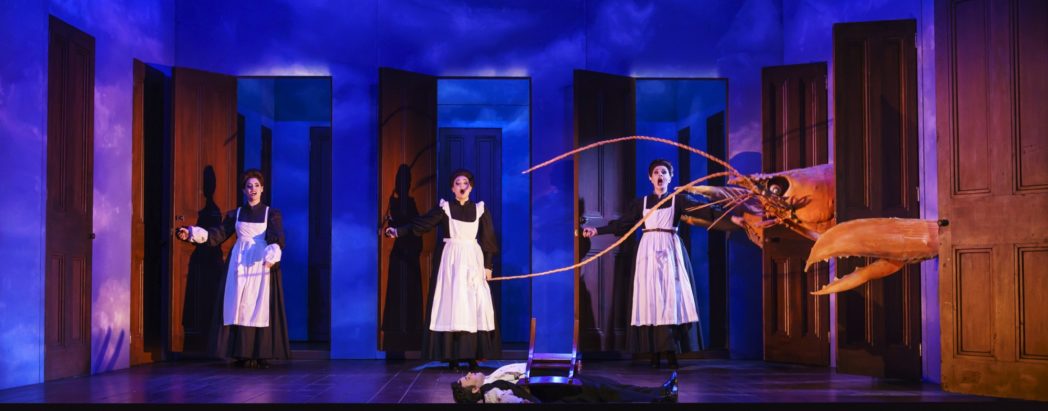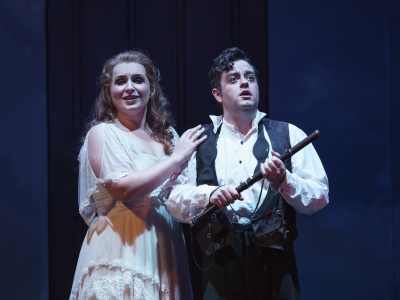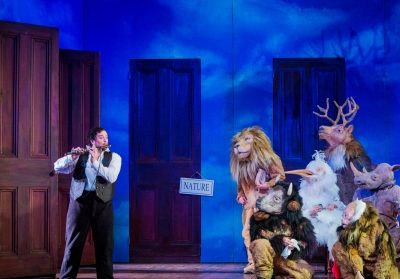As part of Welsh National Opera’s spring season, David Truslove delves into the sumptuous world of Mozart’s The Magic Flute.
Just as you thought the panto season was nearly over, Welsh National Opera has relaunched its visually sumptuous Magic Flute first seen in 2005. This fourth revival along with Un ballo in maschera and Roberto Devereux is designed, according to David Pountney, as part of a Spring focus on “the profound and mysterious issue of Monarchy”. In Mozart’s Singspiel, ancient superstitions are abandoned for reason and a partnership of equals emerges after several testing ordeals for Tamino and Pamina whose joyful union is ultimately celebrated. Sounds cosy, but notions of power and equality propounded by Mozart’s librettist Emanuel Schikaneder are merely ideals, and in that sense, we’ve not come very far since Viennese audiences first heard this musical fairy-tale in 1791.

But the work’s exploration of Enlightenment values, narratives on morals and power (not forgetting masonic ritual) are mostly kept in check and given a surrealist twist in cultural references from Max Ernst’s Eye of Silence to Magritte’s bowler hats, with a dash of Salvador Dali thrown in during the opening scene where Tamino struggles vainly to subdue a flailing lobster. That said, it’s a realistic glimpse into 18th century theatrical life Vienna, a contemporary makeover of streetwise humour, mystery and spectacle rolled into one. It’s all given a light touch and as theatre for first-time opera goers or children of all ages it works on an immediately appealing level. But any interpretative insight is left to fascinating concepts outlined in the programme. It’s a production that plays for laughs, as Dominick Cooke and designer Julian Crouch serve up a visual feast, where issues (amongst others) of misogyny and sexism are almost submerged in its fast-moving action and colloquial English translation by Jeremy Sams.
An orange suited Brotherhood, boys riding airborne penny-farthings, party-style animal costumes (straight from children’s television) all hold the eye, and if the bare stage with its nine symmetrical doors seems, by contrast, too plain, then there’s nothing ordinary about the singing. Whilst not dazzling, the vocal performances are consistently impressive and mostly succeed in conveying the opera’s serious concerns. Leading the cast, Ben Johnson is a bright-toned Tamino, heroic in voice and deed, if somewhat pallid in terms of stage presence. Anita Watson is a fresh-voiced Pamino, whose chemistry with Papageno in their opening duet on the virtues of marriage is as natural as it is engaging, and her despairing ‘Ach, ich fühl’s’, deeply moving. Sailing effortlessly up to the musical stratosphere is Polish soprano Anna Siminska as Queen of the Night whose “high wire” arias show off a flawless technique and jewel-like timbre – not as regally sinister as one might wish for but there’s enough steel in the voice to compensate. At the extreme lower end of the vocal register is James Platt as a cavernous Sarastro with a commanding presence and a voice of such inky, luxurious depth that almost suggests benevolence. His ‘O Isis und Osiris’ brought authority but with it a monochrome tone. Not so Howard Kirk’s more supple but vile Monostatos, wonderfully insidious as a disturbing blend of Harold Shipman and Albert Steptoe.

Gareth Brynmor John (singing again on 6th April) is a winning Papageno, clearly enjoys his role as comic foil to Tamino and sings with fulsome tone. My only reservation is the decision for him to exchange his birdcage for a wooden chair which he lugs around like a substitute comfort blanket. It makes little sense until the chair is used to assist his attempted suicide – a moment that failed to draw on our emotions. More convincing was his interactions with Claire Hampton as amusing crone and wife-to-be. Other well-handled roles are a trio of look-alike chambermaids whose harmonious singing catches the ear, as does Tamino’s three tuneful guides (a girl and two boys) dressed as if they belonged to the Vienna Boys’ Choir.
In the pit, making his WNO conducting debut, is Damian Iorio who brings efficiency, if not period style with a resulting orchestral sound that veers from routine to rough and ready. Some extreme tempi created a pedestrian overture (prompting applause in the middle) and a fast, undignified and nearly unrecognisable ‘March of the Priests’. In time, things may grip as convincingly below stage as they do above.
David Truslove is a regular contributor to Wales Arts Review’s music section.











